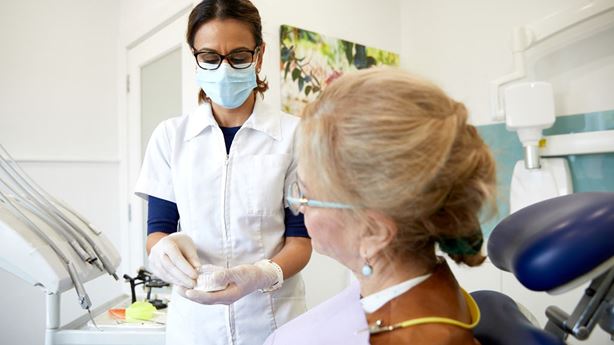Is Periodontal Disease Contagious?
When we’re told about the importance of good oral hygiene, it’s important to remember that oral hygiene goes well above and beyond just brushing the teeth. Sure, looking after the teeth is an integral part of good oral hygiene, but we should also note that looking after the gums can be equally as important.
Gum diseases can affect people of all ages, genders, shapes, sizes, creeds and colours, regardless of what kind of diet, lifestyle, and oral habits they have. With that said however, it’s important to note that diseases such as periodontal disease can cause a whole host of issues.
With all of the talk of viruses and diseases as of late, the last thing we want to do is worry about yet another ailment. Unfortunately however, we need to, and the ailment in question is periodontal disease.
But what is periodontal disease and more importantly is periodontal disease contagious?
These questions, and many more, will soon be answered as we take a detailed look at periodontal disease.
What is periodontal disease?
Periodontal diseases are more common than a lot of people realize. Commonly known as Gingivitis, periodontal disease is a condition affecting the gums, causing them to become inflamed and sensitive.
Caused by infection and inflammation, periodontal disease not only affects the gums, it can also affect the bone surrounding the gums.
The early stages of this condition are known as gingivitis. Here, gums will become inflamed and swollen, and they may even bleed. If the disease is allowed to progress however, it can lead to a condition known as periodontitis, which causes the gums to be pulled from the teeth, and bone to erode away. This can lead to tooth decay and even the loss of teeth.
Though it can affect anybody, studies have found that you are statistically more likely to be affected by periodontal disease as you get older. Gender also plays a part as males are more likely to be affected than women.
Is periodontal disease contagious?
So, the big question ‘is periodontal disease contagious?’ Well, the answer to that is both yes, and no.
No, you can’t give somebody gum disease if you come into contact with them, but what you can do is transmit the harmful bacteria responsible for causing periodontal disease, so essentially periodontal disease can be classed as contagious.
Can gum disease spread to the other teeth?
Another concern for people affected by periodontal disease, is whether or not gum disease can spread to the other teeth.
The answer to that is yes. Periodontal disease can spread to other parts of the soft tissue and bone responsible for keeping the teeth anchored in place (the periodontium) and once it sets in it can cause the same damage and symptoms that it caused in other teeth and in other parts of the mouth.
How can you spread gum disease?
As mentioned, technically periodontal disease is not contagious, but rather, the bacteria that causes it is.
If you want to minimize the risk of spreading gum disease, it’s important to learn how the bacteria is spread in the first place.
Here’s a look at a few activities which can spread gum disease-causing bacteria:
- Kissing - Kissing is one of the most common ways in which gum disease-causing bacteria is spread, due to the nature of the activity.
When you kiss somebody else, bacteria in your mouth can be transferred to them, where it could then cause an infection and trigger the early stages of gingivitis. - Drinking from the same bottle/cup - Another way in which gum disease can be spread is by drinking from the same cup/bottle.
If you drink from a cup or bottle, bacteria in your mouth will be left behind on traces of your saliva. As soon as somebody drinks from the same vessel as you, the bacteria will be transferred to their mouth where it can grow and multiply and cause infection. - Sharing cutlery - How many times have you asked somebody you know to taste something you’re eating, or you’ve made, and you’ve given them the same cutlery to taste it with that you were using? Well, each time you did you were passing bacteria in your mouth into theirs.
Who is most at risk of periodontal disease?
So, we’ve answered the question of is periodontal disease contagious, and we briefly touched upon who is most at risk. What we’ll do now however, is elaborate on this and look at who is most at risk, and why.
According to official statistics, more than 70% of adults aged 65 or over are affected by periodontal disease. Gender is also a factor, as 56.4% of males are affected, compared with 34. 6% of females.
What are the warning signs of gum disease?
If you’re concerned you may be affected by periodontal disease, it pays to know the warning signs. Some of the more common warning signs and symptoms of periodontal disease include:
Bad breath Bad taste in the mouth that won’t go away Sensitive teeth Swollen or inflamed gums Red gums Bleeding gums Difficulty chewing Toothache Changes in the shape and structure of teeth in the jaw Receding gums Loose/wobbly teeth Tooth loss
How to treat/prevent periodontal disease
As you can see, periodontal disease is not a pleasant condition and it’s something which we all surely would wish to avoid. The good news is that it is fairly easy to stop, treat, and prevent periodontal disease.
The most obvious way is to practice good oral hygiene on a daily basis. Brush your teeth thoroughly twice per day, floss, use mouthwash, avoid overly sugary and acidic foods, and be aware of any of the symptoms or warning signs that we’ve listed above.
Perhaps most importantly of all however, is to ensure that you visit your dentist regularly, even if you feel that your teeth are fine. Your dentist will examine your teeth and can diagnose any warning signs of periodontal disease nice and early, so you can address them before they become an issue.








